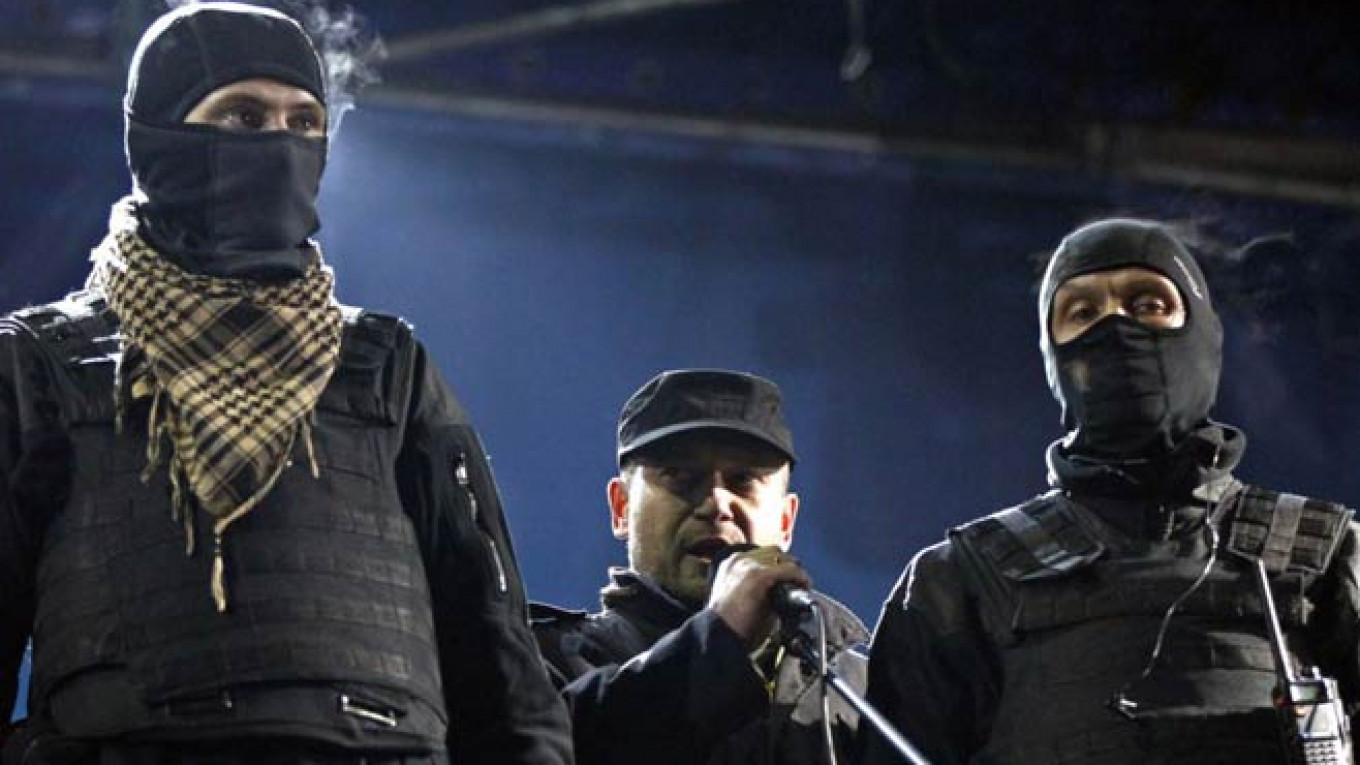Even while Russia's state-controlled television has been alarming its viewers with stories about "fascists" in the Right Sector party that have come to power in Ukraine, the newly formed government in Kiev has hastily begun cleaning up and disarming the organization. Like all illegal, armed groups, it had started to fill up with fringe, extremist forces.
The Interior Ministry arrested and killed one of the most extreme Right Sector members, Alexander Muzychko, and evicted the party from its offices in the Dnieper Hotel in the heart of Kiev. At the same time, my colleagues in Kiev have increasingly referred to Right Sector as an organization packed with not only violent criminals, but also with provocateurs.
The Right Sector's shining moment came on Feb. 18, when leaders of the opposition Arseny Yatsenyuk, Vitaly Klitschko and Oleh Tyahnybok betrayed the Maidan protesters by meeting with then-Ukrainian President Viktor Yanukovych. Right Sector refused to observe the truce and thus became the symbol of revolutionary fervor.
But following the victory of the revolution, a note written by Yanukovych's security chief revealed that Right Sector leader Dmitry Yarosh had also met with Yanukovych on Feb. 20. With his back to the wall, Yarosh admitted to the meeting. Whereas the other opposition leaders had met with Yanukovych openly, Yarosh had done so in secret.
What's more, Feb. 20 marked the high point of the street fighting. On that day, Yarosh was at the party's headquarters at the Dnieper Hotel after moving there from the burnt-out Trade Union building on Feb. 19. The center of the city was closed off, no cars moved and people were dropping like flies under a hail of snipers' bullets. To get from the Dnieper Hotel to a meeting at the presidential residence, Yarosh would have had to pass through that gauntlet of sniper fire. What guarantee did he have that the snipers would not shoot at him, or that he would manage to return alive from the meeting?
Also, it turns out that Right Sector received a large amount of money in January and February, enough for the organization to expand and arm its members. Many observers pointed their fingers at Andrei Klyuyev, who was the former head of the Yanukovych administration and the chief specialist in discrediting the opposition. What's more, it turned out that not a single Right Sector member was among the 100 Maidan protesters who died.
Here is my theory of what happened. I would guess that following the heavy fighting on Hrushevsky Street on Jan. 19 in which Right Sector figured prominently, it seems to me that someone close to Yanukovych gave Right Sector money so that they would stop fighting. Like a true revolutionary, Yarosh took the money, bought weapons with it and continued to fight — happy to have made suckers out of the authorities.
But it turned out that they were not made suckers of so easily because someone close to Yanukovych told President Vladimir Putin through Viktor Medvedchuk, who still serves as Putin's principle adviser on Ukraine, that fascists financed by the West were staging the revolution in Ukraine.
In any case, Putin, it would seem, sincerely believed that the European Union is financing Right Sector. Obviously, the EU is not financing Right Sector, but the organization definitely did receive a large sum of money from someone.
Yulia Latynina hosts a political talk show on Ekho Moskvy radio.
A Message from The Moscow Times:
Dear readers,
We are facing unprecedented challenges. Russia's Prosecutor General's Office has designated The Moscow Times as an "undesirable" organization, criminalizing our work and putting our staff at risk of prosecution. This follows our earlier unjust labeling as a "foreign agent."
These actions are direct attempts to silence independent journalism in Russia. The authorities claim our work "discredits the decisions of the Russian leadership." We see things differently: we strive to provide accurate, unbiased reporting on Russia.
We, the journalists of The Moscow Times, refuse to be silenced. But to continue our work, we need your help.
Your support, no matter how small, makes a world of difference. If you can, please support us monthly starting from just $2. It's quick to set up, and every contribution makes a significant impact.
By supporting The Moscow Times, you're defending open, independent journalism in the face of repression. Thank you for standing with us.
Remind me later.








